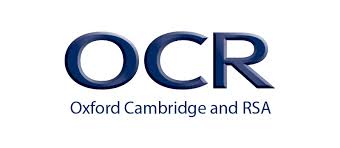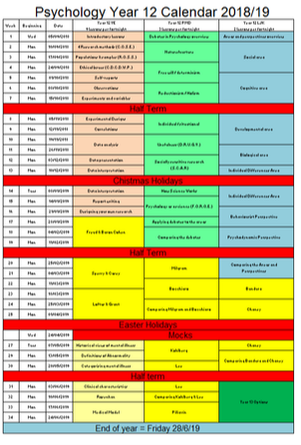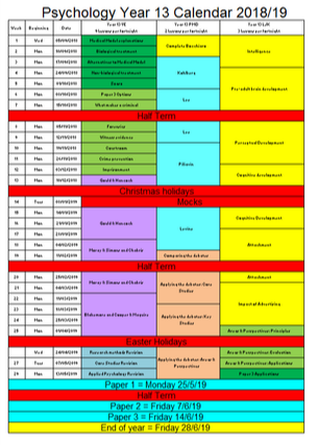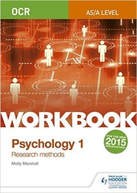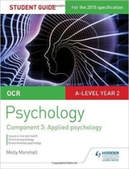What is my child learning?
| Psychology Calendar 2018-19 | |
| File Size: | 30 kb |
| File Type: | xlsx |
|
Mrs Vanessa Evagora
Roles in school: Head of Psychology, EPQ Co-ordinator, UCAS Advisor House: Martineau's Classroom: Ps1 Specialist areas in Psychology: Research Methods, Cognitive and Criminal Psychology |
Mr Paul Dunstan
Roles in school: Director of Foundation Development House: McGills Classroom: Bs2 Specialist areas in Psychology: Debates & Issues, Social and Developmental Psychology |
Mr Luke Kirsten
Roles in school: Assistant Housemaster, Head of Cricket House: Kennedys Classroom: OE1 Specialist areas in Psychology: Areas & Perspectives in Psychology, Child Psychology |

How can I support my child's Independent Learning?
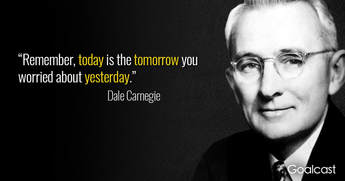
The national expectation of the work an A Level student should be doing independently follows the 'Carnegie' model - for every hour in a lesson with a teacher, the student should be doing 2 hours of independent work. This independent work can be:
- Prep / Homework
- Preparation for lessons
- Using Private Study sessions
- Revising your knowledge and skills
- Practising your skills
- asking their child about what they have been learning
- asking their child about how they have been researching this further
|
Supplementing class and homework with independent learning is the ONLY way to secure a credible grade.
Research further - Best Websites Research further - Best Youtube videos
Complete the exercises in your textbook and Revision workbooks
Practise further with text / revision books
|
| ||||||
What Prep is Set for my Child?
Prep is set by all 3 Psychology teachers.
Each prep is detailed on Show My Homework.
Parents can access the homework which has been detailed on SMHW
Prep is set by all 3 Psychology teachers.
Each prep is detailed on Show My Homework.
Parents can access the homework which has been detailed on SMHW
Parents Evenings, Grades and Reports
Every term, parents receive either grades, a report or an invitation to a parents evening.
Every term, parents receive either grades, a report or an invitation to a parents evening.
